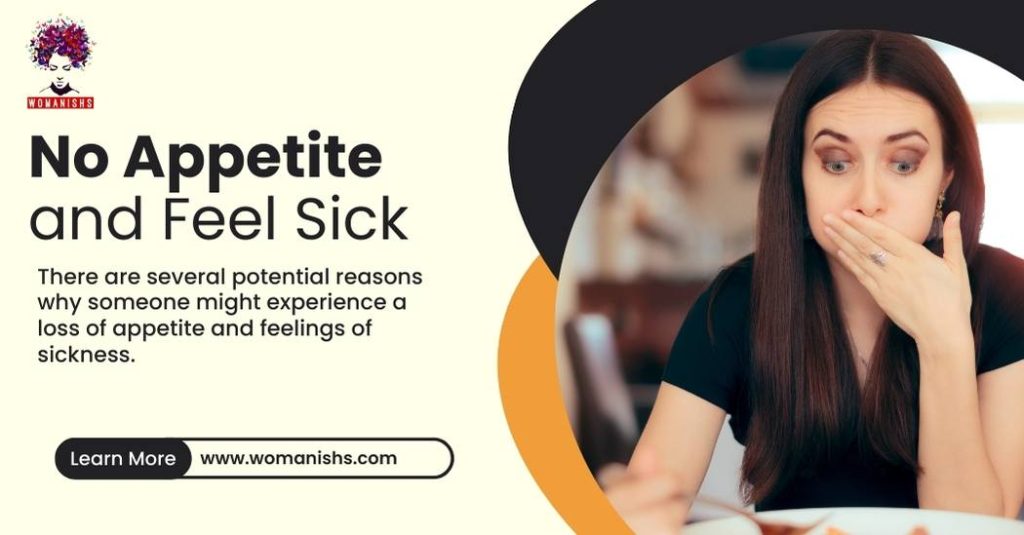There are several potential reasons why someone might experience a loss of appetite and feelings of sickness. i have no appetite and feel sick when i eat. If you’re experiencing a loss of appetite and feeling sick when you eat, it’s essential to consult a healthcare professional for a proper evaluation and diagnosis. There can be various underlying causes for these symptoms, and a medical professional will be able to provide you with appropriate guidance and treatment options. Here are some possible explanations:
I have no appetite and feel sick when I eat
- Illness or Infection: When the body is fighting off an infection or illness, it is common to experience a decreased appetite and feelings of sickness. This could be due to conditions such as the flu, colds, sinus infections, urinary tract infections, or other types of infections.
- Gastrointestinal Issues: Various gastrointestinal conditions can lead to a loss of appetite and feelings of sickness. These include gastroenteritis (stomach flu), gastritis, gastroesophageal reflux disease (GERD), peptic ulcers, or inflammatory bowel disease (IBD).
- Medications and Side Effects: Some medications can cause a decrease in appetite and feelings of sickness as side effects. This can occur with certain antibiotics, pain medications, antidepressants, or medications used to manage other health conditions.
- Stress and Anxiety: High levels of stress or anxiety can impact appetite and digestion. Some individuals may experience a loss of appetite or feelings of nausea when they are under significant stress or dealing with anxiety-related disorders.
- Hormonal Changes: Hormonal fluctuations, such as those experienced during pregnancy or menstrual cycles, can affect appetite and cause feelings of sickness. Morning sickness, for example, is a common symptom in early pregnancy characterized by nausea and a reduced desire to eat.
- Psychological Factors: Mental health conditions, including depression and eating disorders, can affect appetite and contribute to feelings of sickness.
- Other Medical Conditions: Various medical conditions such as thyroid disorders, liver disease, kidney disease, cancer, or chronic pain can impact appetite and cause feelings of sickness.
It’s important to note that this list is not exhaustive, and a comprehensive evaluation by a healthcare professional is necessary to determine the specific cause of your symptoms. They will consider your medical history, conduct appropriate tests if needed, and provide a proper diagnosis and treatment plan based on your individual circumstances.

Why Appetite Loss and Nausea Occur Together
Appetite loss and nausea can occur together for various reasons, and understanding the potential causes can help determine the appropriate course of action. Here are some possible explanations for why these symptoms may occur together:
- Gastrointestinal Issues: Conditions such as gastritis, gastroenteritis, peptic ulcers, or gastroesophageal reflux disease (GERD) can lead to inflammation or irritation in the digestive tract. These conditions can cause both a loss of appetite and nausea or vomiting.
- Infections: Certain infections, such as viral or bacterial gastroenteritis, can cause gastrointestinal symptoms like nausea, vomiting, and loss of appetite. These infections may also be accompanied by other symptoms like diarrhea or abdominal pain.
- Medications and Treatments: Some medications or medical treatments, such as chemotherapy, radiation therapy, or certain antibiotics, can have gastrointestinal side effects, including appetite loss and nausea.
- Psychological Factors: Emotional stress, anxiety, or depression can affect the digestive system and lead to a loss of appetite and feelings of nausea. The mind-body connection plays a significant role in regulating appetite and digestion.
- Hormonal Changes: Hormonal fluctuations, particularly during pregnancy, can cause nausea and a change in appetite. Morning sickness, a common symptom during early pregnancy, is characterized by nausea and a decreased desire to eat.
- Food Intolerances or Allergies: Some individuals may experience adverse reactions to certain foods, such as lactose intolerance or gluten sensitivity, which can lead to gastrointestinal discomfort, nausea, and a decreased appetite.
It’s important to note that these are general potential causes, and a thorough evaluation by a healthcare professional is necessary to determine the specific underlying cause of your symptoms. They will consider your medical history, perform any necessary tests, and provide appropriate diagnosis and treatment options tailored to your situation.
